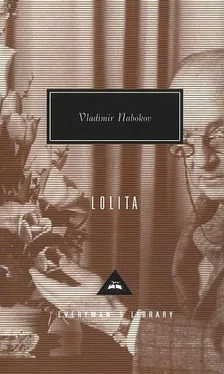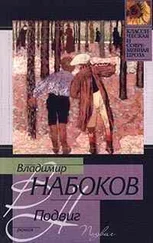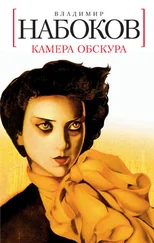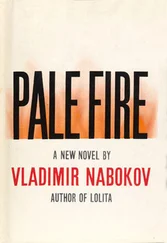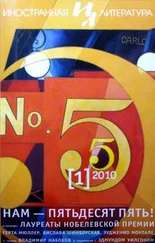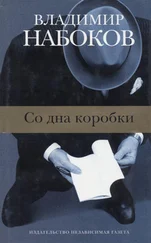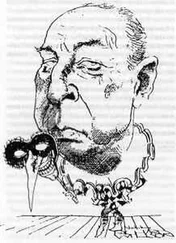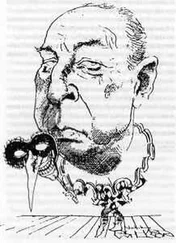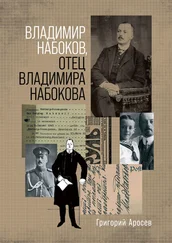A thousand-mile stretch of silk-smooth road separated Kasbeam, where, to the best of my belief, the red fiend had been scheduled to appear for the first time, and fateful Elphinstone which we had reached about a week before Independence Day. The journey had taken up most of June for we had seldom made more than a hundred and fifty miles per traveling day, spending the rest of the time, up to five days in one case, at various stopping places, all of them also prearranged, no doubt. It was that stretch, then, along which the fiend’s spoor should be sought; and to this I devoted myself, after several unmentionable days of dashing up and down the relentlessly radiating roads in the vicinity of Elphinstone.
Imagine me, reader , with my shyness, my distaste for any ostentation, my inherent sense of the comme il faut , imagine me masking the frenzy of my grief with a trembling ingratiating smile while devising some casual pretext to flip through the hotel register: “Oh,” I would say, “I am almost positive that I stayed here oncelet me look up the entries for mid-Juneno, I see I’m wrong after allwhat a very quaint name for a home town, Kawtagain. Thanks very much.” Or: “I had a customer staying hereI mislaid his addressmay I…?” And every once in a while, especially if the operator of the place happened to be a certain type of gloomy male, personal inspection of the books was denied me.
I have a memo here: between July 5 and November 18, when I returned to Beardsley for a few days, I registered, if not actually stayed, at 342 hotels, motels and tourist homes. This figure includes a few registrations between Chestnut and Beardsley, one of which yielded a shadow of the fiend (“N. Petit, Larousse, Ill.”); I had to space and time my inquiries carefully so as not to attract undue attention; and there must have been at least fifty places where I merely inquired at the deskbut that was a futile quest, and I preferred building up a foundation of verisimilitude and good will by first paying for an unneeded room. My survey showed that of the 300 or so books inspected, at least 20 provided me with a clue: the loitering fiend had stopped even more often than we, or elsehe was quite capable of thathe had thrown in additional registrations in order to keep me well furnished with derisive hints. Only in one case had he actually stayed at the same motor court as we, a few paces from Lolita’s pillow. In some instances he had taken up quarters in the same or in a neighboring block; not infrequently he had lain in wait at an intermediate spot between two bespoken points. How vividly I recalled Lolita, just before our departure from Beardsley, prone on the parlor rug, studying tour books and maps, and marking laps and stops with her lipstick!
I discovered at once that he had foreseen my investigations and had planted insulting pseudonyms for my special benefit. At the very first motel office I visited, Ponderosa Lodge, his entry, among a dozen obviously human ones, read: Dr. Gratiano Forbeson, Mirandola, NY. Its Italian Comedy connotations could not fail to strike me, of course. The landlady deigned to inform me that the gentleman had been laid up for five days with a bad cold, that he had left his car for repairs in some garage or other and that he had checked out on the 4th of July. Yes, a girl called Ann Lore had worked formerly at the Lodge, but was now married to a grocer in Cedar City. One moonlit night I waylaid white-shoed Mary on a solitary street; an automaton, she was about to shriek, but I managed to humanize her by the simple act of falling on my knees and with pious yelps imploring her to help. She did not know a thing, she swore. Who was this Gratiano Forbeson? She seemed to waver. I whipped out a hundred-dollar bill. She lifted it to the light of the moon. “He is your brother,” she whispered at last. I plucked the bill out of her moon-cold hand, and spitting out a French curse turned and ran away. This taught me to rely on myself alone. No detective could discover the clues Trapp had tuned to my mind and manner. I could not hope, of course, he would ever leave his correct name and address; but I did hope he might slip on the glaze of his own subtlety, by daring, say, to introduce a richer and more personal shot of color than strictly necessary, or by revealing too much through a qualitative sum of quantitative parts which revealed too little. In one thing he succeeded: he succeeded in thoroughly enmeshing me and my thrashing anguish in his demoniacal game. With infinite skill, he swayed and staggered, and regained an impossible balance, always leaving me with the sportive hopeif I may use such a term in speaking of betrayal, fury, desolation, horror and hatethat he might give himself away next time. He never didthough coming damn close to it. We all admire the spangled acrobat with classical grace meticulously walking his tight rope in the taclum light; but how much rarer art there is in the sagging rope expert wearing scarecrow clothes and impersonating a grotesque drunk! I should know.
The clues he left did not establish his identity but they reflected his personality, or at least a certain homogenous and striking personality; his genre, his type of humorat its best at leatthe tone of his brain, had affinities with my own. He mimed and mocked me. His allusions were definitely highbrow. He was well-read. He knew French. he was versed in logodaedaly and logomancy. He was an amateur of sex lore. He had a feminine handwriting. He would change his name but he could not disguise, no matter how he slanted them, his very peculiar t’s, w’s and l’s. Quelquepart Island was one of his favorite residences. He did not use a fountain pen which fact, as any psychoanalyst will tell you, meant that the patient was a repressed undinist. One mercifully hopes there are water nymphs in the Styx.
His main trait was his passion for tantalization. Goodness, what a tease the poor fellow was! He challenged my scholarship. I am sufficiently proud of my knowing something to be modest about my not knowing all; and I daresay I missed some elements in that cryprogrammic paper chase. What a shiver of triumph and loathing shook my frail frame when, among the plain innocent names in the hotel recorder, his fiendish conundrum would ejaculate in my face! I noticed that whenever he felt his enigmas were becoming too recondite, even for such a solver as I, he would lure me back with an easy one. “Arsne Lupin” was obvious to a Frenchman who remembered the detective stories of his youth; and one hardly had to be a Coleridgian to appreciate the trite poke of “A. Person, Porlock, England.” In horrible taste but basically suggestive of a cultured mannot a policeman, not a common good, not a lewd salesmanwere such assumed names as “Arthur Rainbow”plainly the travestied author of Le Bateau Bleu let me laugh a little too, gentlemenand “Morris Schmetterling,” of L’Oiseau Ivre fame ( touch , reader!). The silly but funny “D. Orgon, Elmira, NY,” was from Molire, of course, and because I had quite recently tried to interest Lolita in a famous 18th-century play, I welcomed as an old friend “Harry Bumper, Sheridan, Wyo.” An ordinary encyclopedia informed me who the peculiar looking “Phineas Quimby, Lebanon, NH” was; and any good Freudian, with a German name and some interest in religious prostitution, should recognize at a glance the implication of “Dr. Kitzler, Eryx, Miss.” So far so good. That sort of fun was shoddy but on the whole impersonal and thus innocuous. Among entries that arrested my attention as undoubtable clues per se but baffled me in respect to their finer points I do not care to mention many since I feel I am groping in a border-land mist with verbal phantoms turning, perhaps, into living vacationists. Who was “Johnny Randall, Ramble, Ohio”? Or was he a real person who just happened to write a hand similar to “N.S. Aristoff, Catagela, NY”? What was the sting in “Catagela”? And what about “James Mavor Morell, Hoaxton, England”? “Aristophanes,” “hoax”fine, but what was I missing?
Читать дальше
Конец ознакомительного отрывка
Купить книгу
